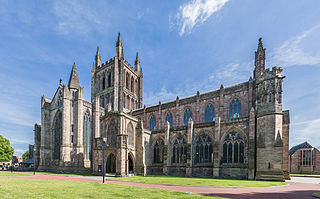Life
Born at Warminster, Wiltshire on 19 September 1787, he was the son of the Rev. Thomas Huntingford, master of Warminster school, and a nephew of George Isaac Huntingford He became a scholar of Winchester College in 1802, and matriculated at New College, Oxford, on 16 April 1807, subsequently becoming a Fellow both of New College and (5 April 1814) and of Winchester. He took the degree of B.C.L. on 1 June 1814.

Warminster is a town and civil parish in western Wiltshire, England, by-passed by the A36 and the partly concurrent A350 between Westbury and Blandford Forum. It has a population of about 17,000. The 11th-century Minster Church of St Denys stands near the River Were, which runs through the town and can be seen running through the town park. The name Warminster first occurs in the early 10th century.

Wiltshire is a county in South West England with an area of 3,485 km2. It is landlocked and borders the counties of Dorset, Somerset, Hampshire, Gloucestershire, Oxfordshire and Berkshire. The county town was originally Wilton, after which the county is named, but Wiltshire Council is now based in the county town of Trowbridge.

Winchester College is an independent boarding school for boys in the British public school tradition, situated in Winchester, Hampshire. It has existed in its present location for over 600 years. It is the oldest of the original seven English public schools defined by the Clarendon Commission and regulated by the Public Schools Act 1868.
In 1822 he was appointed rector of Hampton Bishop, Herefordshire, and in 1838 a prebendary in Hereford Cathedral. He was also rural dean. He died at Goodrest, Great Malvern, on 2 November 1867.

Hampton Bishop is a village and civil parish south-east of Hereford, in Herefordshire, England. The population of the civil parish at the 2011 Census was 505. The village itself is on a wedge between the River Wye and the River Lugg, not far from where the River Frome meets the Lugg.

Herefordshire is a county in the West Midlands of England, governed by Herefordshire Council. It borders Shropshire to the north, Worcestershire to the east, Gloucestershire to the south-east, and the Welsh counties of Monmouthshire and Powys to the west.

Hereford Cathedral is the cathedral church of the Anglican Diocese of Hereford in Hereford, England. Its most famous treasure is Mappa Mundi, a medieval map of the world created around 1300 by Richard of Holdingham. The map is listed on the UNESCO Memory of the World Register. The cathedral is a Grade I listed building. The site of the cathedral became a place of worship in the 8th century or earlier although the oldest part of the current building, the bishop's chapel, dates to the 11th century.




